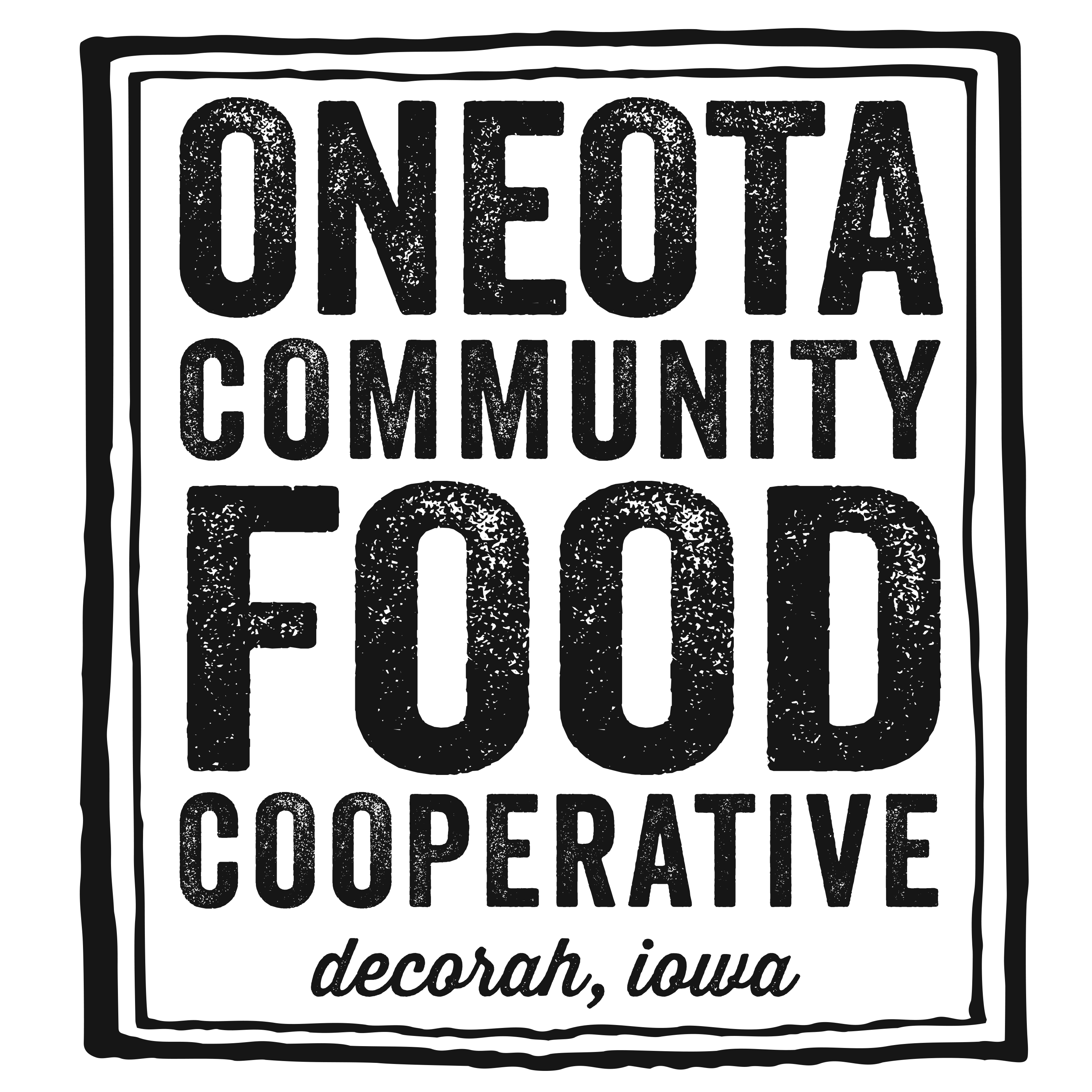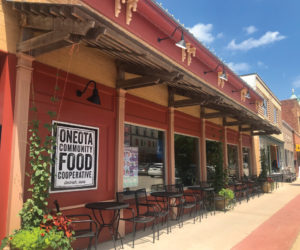By: David Lester, GM
I’m a lousy farmer. The fact that my family and I are raising four backyard chickens for egg production doesn’t even come close to approaching the vocational term, “farmer.” But, if it did, I would still be a lousy farmer. The amount of time and money we put into raising those four birds would make even the smallest of scale farmer laugh. If we were raising chickens for egg production on a much larger scale we would already be out of business and wondering why we named all 500 of them. We’re in it more for the companionship, I guess, and the freshness of the eggs. There’s something about eating scrambled eggs in the morning while watching the chickens scratch, finding insects and chasing each other in the run.
I’m an even lousier gardener. After taking the job of General Manager at the Co-op back in 2010, my partner, Amalia, and I went to work quickly creating our own vegetable garden. We were going to raise the most amazing tomatoes, peppers, zucchini, potatoes and greens. Two feet of weeds and several rotting tomatoes later, the garden thing didn’t work out so well. Lucky for us, we had everything we needed at the Co-op, but needed to adjust the household budget a little bit. Thankfully, the Co-op is a place I can belong, despite my failed attempts at production. One of the most valuable things for me about being a member of our Co-op is supporting a business that aligns with my values and core beliefs around food. And, as an organization, we publicly talk about these beliefs and report on our progress. These values and beliefs are what we call our organizational “Ends.” A little over a year ago our Board decided to refine our Ends and create a new mission statement. This process resulted in six statements that guide our work here at the Co-op:
MISSION STATEMENT
The mission of the Oneota Community Co-op is to build vibrant communities and ecosystems by providing organic, locally produced and bulk foods, as well as other products and services that are sustainable for those who consume and produce them.
CONNECTING LANGUAGE
In pursuit of this Mission the Board of Directors has
approved the following Ends statements:
ORGANIZATIONAL ENDS
Because the Oneota Community Co-op exists as an institution grounded in the cooperative principles, there will be the following:
1. A retail source for food and other products that, to the greatest extent possible, are organic, sustainably produced, local grown and/or processed, and affordable. A business that encourages the expansion of sustainably grown local food sources.
2. A community that is educated about food and other products that are healthy for people and the environment.
3. A business that promotes the development of
cooperation and cooperative enterprise.
4. A business that promotes environmental and financial sustainability.
5. Employment in a work place that provides the personal satisfaction of collaborative work directed toward common goals and provides extraordinary customer service.
6. A diverse, local community whose fabric is strengthened through caring, and sharing gifts of time, energy and resources.
As the General Manager of our store, I work with our team of managers and other staff to address these organizational Ends throughout the year, monitor our progress and report our work back to the Board in the form of an “Ends Report.” Some areas that we have put a lot of effort and focus this past year have been in expanding our local products, education, environmental and financial sustainability and creating a better workplace for our employees. In a few months, you will receive or see this progress in the form of our Annual Report.
In addition to these six goals, our Co-op is a part of an even bigger organization and set of principles. Cooperatives around the world, whether it is a housing coop, worker co-op, consumer co-op or credit union, generally operate according to the same core principles and values. These are the Seven Cooperative Principles:
1. VOLUNTARY AND OPEN MEMBERSHIP
Cooperatives are voluntary organizations, open to all people able to use its services and willing to accept the responsibilities of membership, without gender, social, racial, political or religious discrimination.
2. DEMOCRATIC MEMBER CONTROL
Cooperatives are democratic organizations controlled by their members—those who buy the goods or use the services of the cooperative—who actively participate in setting policies and making decisions.
3. MEMBERS’ ECONOMIC PARTICIPATION
Members contribute equally to, and democratically control, the capital of the cooperative. This benefits members in proportion to the business they conduct with the cooperative rather than on the capital invested.
4. AUTONOMY AND INDEPENDENCE
Cooperatives are autonomous, self-help organizationscontrolled by their members. If the co-op enters into agreements with other organizations or raises capital from external sources, it is done so based on terms that ensure democratic control by the members and maintains the cooperative’s autonomy.
5. EDUCATION, TRAINING AND INFORMATION
Cooperatives provide education and training for members, elected representatives, managers and employees so they can contribute effectively to the development of their cooperative. Members also inform the general public about the nature and benefits of cooperatives.
6. COOPERATION AMONG COOPERATIVES
Cooperatives serve their members most effectively and strengthen the cooperative movement by working together through local, national, regional and international structures.
7. CONCERN FOR COMMUNITY
While focusing on member needs, cooperatives work for the sustainable development of communities through policies and programs accepted by the members. And, if that wasn’t enough for the employees and me to focus on this past year, we also have a set of strategic priorities that were developed through a process that involved Board members and staff to identify four priorities to achieve in the next three to five years. These are:
“Assist in the development of local food hub/processing facility.”
The Co-op has been a partner in this project from the early stages and has seen the food hub grow and increase its reach to more markets in eastern Iowa. The Iowa Food Hub (IFH) is an innovative nonprofit working to connect farmers, families and food grown close to home. IFH unites the mission and vision of these partners by managing the aggregation, distribution and marketing of source-identified food products from local and regional producers to strengthen their ability to satisfy wholesale, retail and institutional demand. You can find out more at: http://www.iowafoodhub.com/
“Expand facility with kitchen classroom.”
We have been pursuing and working towards making this priority happen sooner than later and I’m happy to report that this has become a reality! We will own the building next to the Co-op January 2, 2015 and we have already renovated half of the space to accommodate our beautiful and functional Co-op Kitchen Classroom. See our different class offerings available this winter in this publication or you can go online and sign up for classes via our website at: oneotacoop.com/ education-events.
“Increase Purchases from Local Vendors.”
This priority is never done. We have made substantial progress with more products from local producers on our shelves. In October we hit our highest percentage of local sales: 24%! This translated into almost $100,000 in sales for local items in the month of October and we are on track to sell approximately $1.1 million of locally produced products in 2014.
“Implement patronage dividend program – contingent upon profitability.”
If you were a member and spent more than $1,058 at the Co-op in 2013, then you received a small portion of your purchases back in the form of a patronage dividend. This was the first patronage dividend paid to our members in our new store location. This has been a goal of many Board members since 2008 and it became a reality after the 2013 fiscal year. 2014 looks to be an even better year financially for the Co-op and we want our patronage dividend program to be a regular business practice.
I may not be a great farmer or even a slightly good one, but I do like to think that I am part of growing something because I am an Oneota Co-op member. As a member I am “growing” a business that is conscious of the products it sells and is trying to be the most sustainable business model that it can be. Members of our Co-op are growing more opportunities for local producers and farming families in this part of the world and are also using their purchasing power to support family farmers in other parts of the world who are growing Fair-Trade items. When you become a member at the Oneota Co-op, you are in a sense, becoming a grower. I’d be glad to answer any questions about the products on our shelves or the Co-op in general, but just don’t ask me for advice on chickens or growing vegetables.



